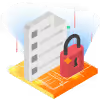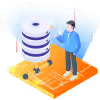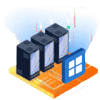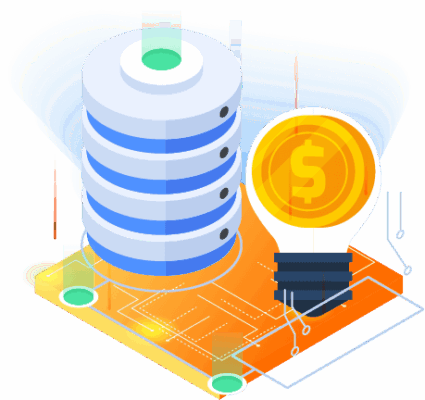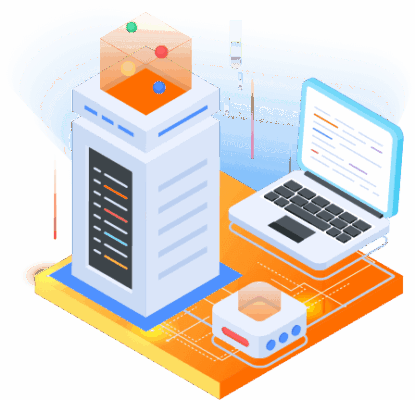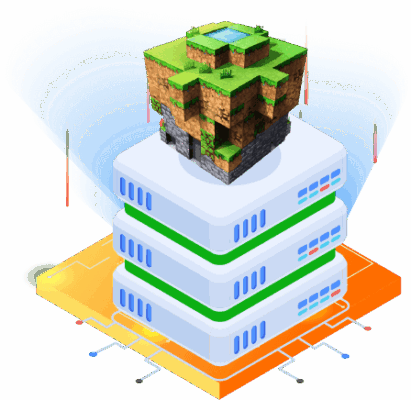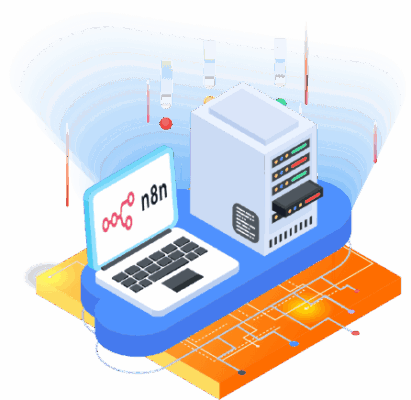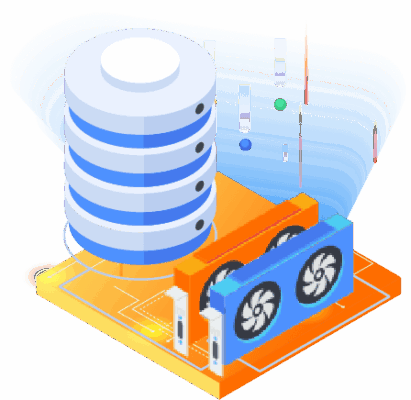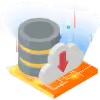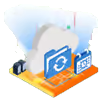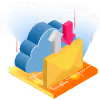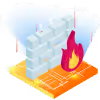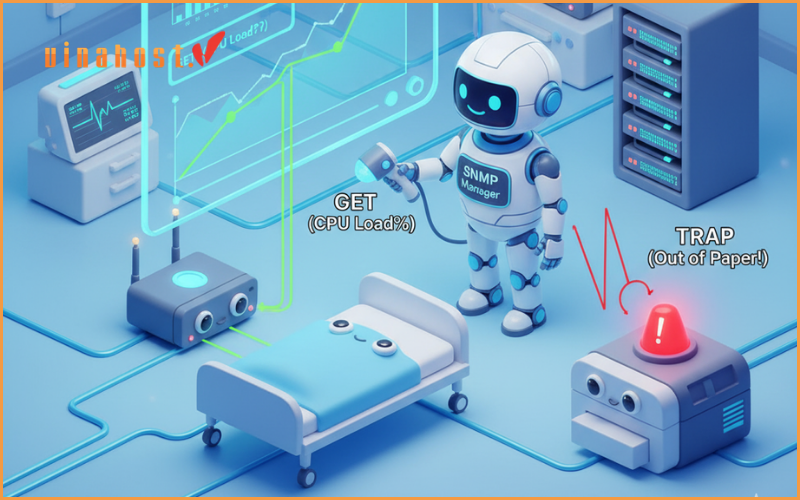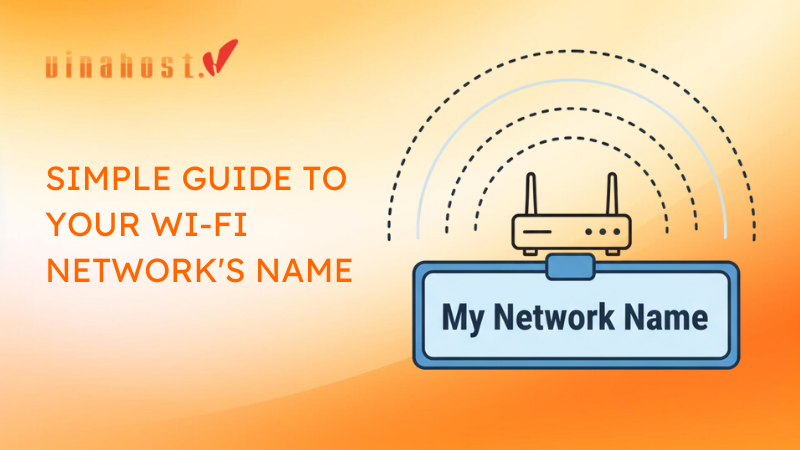Application server play a role as the brain of web apps, processing data, generating dynamic content, and interacting with databases. But exactly what is an application server and how does it work? This article of VinaHost aims to illuminate the definition of application servers, explore their core functions and operational intricacies. Through an exploration of their functionality and operation, this exposition endeavors to provide clarity on the vital role application servers play in facilitating dynamic web applications.
1. What is an Application Server?
What is the application server? An application server is a type of server that hosts and manages software applications and services for client devices over a network. It provides a runtime environment and infrastructure for running applications, handling client requests, and delivering data or functionality to users or other applications.
Application servers are commonly used in client-server architectures, web-based applications, and enterprise environments to centralize and manage the execution of applications and services.
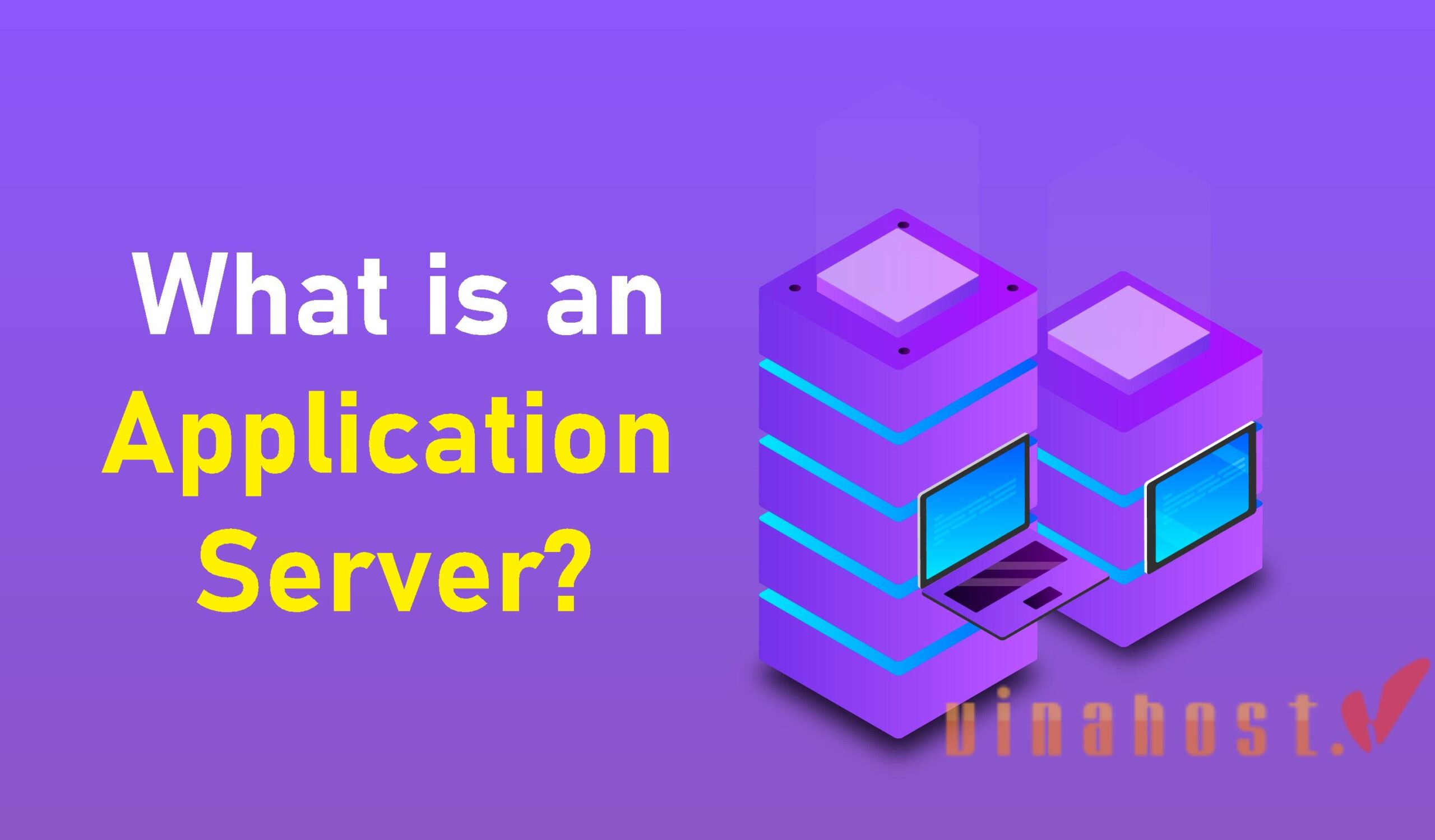
Also read: What is a Server? Understanding the Backbone of Modern Technology
2. How Does an Application Server Work?
An application server works by providing a runtime environment and infrastructure for hosting and managing software applications and services.
An application server serves as the backbone of software applications and services, providing the infrastructure and runtime environment necessary for their execution, management, and interaction with client devices and users.
- Client request handling: When a client device or user requests access to an application or service, the request is sent over the network to the application server.
- Routing and load balancing: In a distributed or clustered environment, the application server may use routing and load balancing mechanisms to distribute incoming requests among multiple server instances for optimal performance and scalability.
- Application execution: The application server hosts and manages the execution of the requested application or service. It provides a runtime environment where the application code can run, including libraries, frameworks, and runtime dependencies.
- Data access: The application server may interact with data sources such as databases, file systems, or external services to retrieve or manipulate data required by the application. It manages database connections, transactions, and data access operations to ensure data integrity and consistency.
- Business logic execution: The application server executes the business logic or processing logic defined within the application code. This may include processing user inputs, performing calculations, applying business rules, and generating responses or outputs.
- Integration and communication: The application server facilitates communication and integration with other systems, services, or components within the environment. It may interact with external services, APIs, or messaging systems to exchange data or trigger actions.
- Response generation: Once the application logic is executed and data is processed, the application server generates a response to the client request. This response may include HTML content for web applications, data payloads for API requests, or other forms of output based on the application’s functionality.
- Delivery to clients: Finally, the application server delivers the response back to the client device or user over the network, completing the request-response cycle. The client device then processes the response and presents it to the user or initiates further interactions with the application.
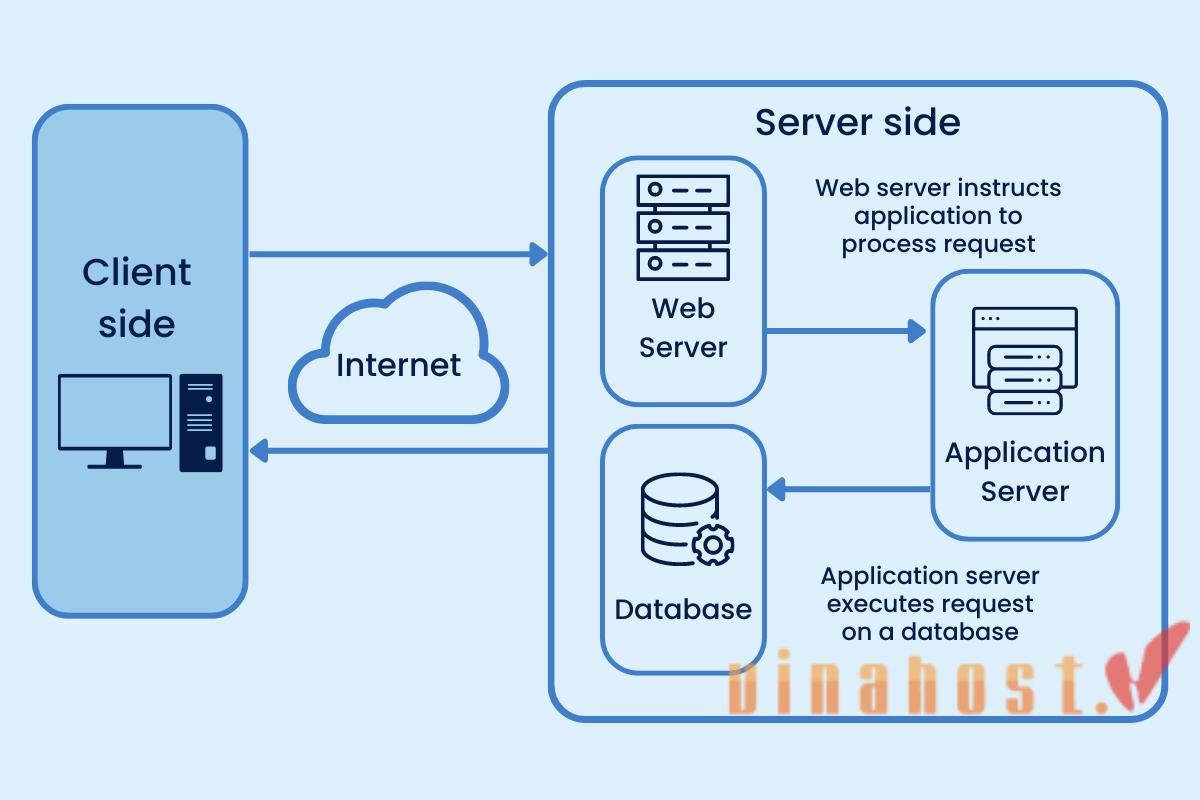
Whether you’re a developer, IT professional, or simply curious about the inner workings of the web, understanding “what is application server” unlocks a deeper appreciation for the intricate role that delivers the seamless online experiences we’ve come to expect. As web technologies continue to evolve, application servers will undoubtedly adapt and remain a cornerstone of web application development.
Also Read: What is a Dedicated Server? | How Does a Dedicated Server Work?
3. Types of Application Servers
These are just a few examples of the types of application servers available, each serving specific needs and requirements in various domains such as web development, enterprise computing, cloud services, mobile applications, and messaging systems.
Web Application Servers (WAS):
- Focus: These are the most widely used type, specifically designed to handle web applications. They excel at processing user requests from web browsers and generating dynamic content.
- Supported Technologies: WAS often provide built-in support for popular web development technologies like Java Server Pages (JSP), Servlets (Java), PHP, and ASP.NET (Microsoft).
- Examples: Apache Tomcat, WildFly (JBoss), Nginx, Microsoft Internet Information Services (IIS).
Enterprise Application Servers (EAS):
- Focus: These cater to complex enterprise applications that require robust features and scalability. They go beyond basic web functionalities and support mission-critical business processes.
- Capabilities: EAS offer features like transaction processing (ensuring data consistency across databases), integration with legacy systems (connecting to older applications), and high availability (minimizing downtime).
- Examples: IBM WebSphere Application Server, Oracle WebLogic Server, Red Hat JBoss Enterprise Application Platform (JBoss EAP).
Cloud-Based Application Servers:
- Delivery Model: These application servers are hosted on cloud platforms like Amazon Web Services (AWS), Microsoft Azure, or Google Cloud Platform (GCP).
- Benefits: They offer scalability and elasticity, allowing businesses to easily adjust resources based on traffic demands. Additionally, they eliminate the need for on-premises server infrastructure and maintenance.
- Examples: AWS Elastic Beanstalk, Azure App Service, Google App Engine.
Mobile Application Servers:
- Focus: These cater specifically to the development and deployment of mobile applications. They handle functionalities like push notifications, user authentication, and data synchronization between mobile devices and backend systems.
- Examples: Kony Mobile Platform, Amazon Mobile Hub, Firebase.
Content Management System (CMS) Servers:
- Integration: These are often bundled with Content Management Systems (CMS) like WordPress or Drupal. They provide a platform for managing website content, user accounts, and security within the CMS framework.
- Examples: Apache (used with WordPress), Microsoft IIS (used with Drupal).
Also read: What is a Cloud Server? | How does a Cloud Server work?
4. Benefits of Using an Application Server

What is an Application Server benefits? Using an application server offers numerous benefits, including centralized management, improved performance, enhanced security, scalability, resource optimization, support for standards, and faster development and deployment, making them indispensable components of modern software development and hosting environments.
Application server streamline development processes, enhance security, improve performance and scalability, and ultimately contribute to a more robust and user-friendly web application experience.
- Centralized management: Application servers provide a centralized platform for deploying, managing, and scaling multiple applications. They streamline administrative tasks such as configuration management, monitoring, and troubleshooting, reducing complexity and improving operational efficiency.
- Improved performance: Application servers are optimized for hosting applications, providing a runtime environment that can enhance application performance and responsiveness. They offer features such as connection pooling, caching, load balancing, and optimized resource allocation, which can improve scalability and throughput.
- Enhanced security: Application servers often include built-in security mechanisms to protect applications and data from unauthorized access, attacks, and vulnerabilities. They may offer features such as SSL/TLS encryption, access control, authentication, and intrusion detection/prevention systems, helping to ensure the integrity and confidentiality of sensitive information.
- Scalability and availability: Application servers support horizontal and vertical scaling to accommodate growing demands and ensure high availability and reliability. They offer features such as clustering, replication, failover, and auto-scaling, allowing applications to scale dynamically based on workload fluctuations and ensuring uninterrupted service availability.
- Resource optimization: Application servers optimize resource utilization by efficiently managing memory, processing power, and network bandwidth. They provide features such as connection pooling, thread management, and resource pooling, minimizing overhead and maximizing resource efficiency.
- Support for standards and protocols: Application servers adhere to industry standards and protocols, ensuring compatibility and interoperability with various technologies, frameworks, and development tools. They support standards such as HTTP, HTTPS, SOAP, REST, J2EE, and .NET, enabling developers to build and deploy applications using familiar tools and technologies.
- Faster development and deployment: Application servers provide development frameworks, libraries, and tools that streamline application development, testing, and deployment processes. They offer features such as application templates, deployment automation, and integrated development environments (IDEs), accelerating time-to-market and reducing development cycles.
5. Key Features to Consider in an Application Server
Selecting the ideal application server requires a balanced approach, considering features that impact performance, manageability, functionality, and overall cost-effectiveness.
- Performance: Assess the application server’s performance capabilities, including its ability to handle high loads, response times, and throughput. Look for features such as caching mechanisms, optimized code execution, and efficient resource utilization.
- Administration: Evaluate the ease of administration and management features provided by the application server. Consider factors such as user interface intuitiveness, automation capabilities, and support for monitoring and troubleshooting tools.
- Development: Look for features that enhance developer productivity and support modern development practices. Consider factors such as IDE integration, debugging support, and compatibility with popular programming languages and frameworks.
- Support: Consider the level of technical support offered by the vendor, including response times, availability, and expertise. Additionally, assess the availability of documentation, tutorials, and training resources to assist with troubleshooting and learning.
- Compliance: Ensure that the application server meets relevant compliance standards and regulatory requirements applicable to your industry or region. Look for features such as security certifications, encryption capabilities, and audit logging functionalities.
- Scalability: Assess the application server’s scalability capabilities to accommodate growing workloads and user demand. Look for features such as horizontal and vertical scaling, load balancing, and support for auto-scaling to ensure seamless expansion as your needs evolve.
- Reliability: Evaluate the reliability and availability features of the application server to minimize downtime and ensure uninterrupted operation. Consider features such as failover support, clustering, and built-in redundancy to maintain service continuity.
- Cost: Consider the total cost of ownership (TCO) of the application server, including licensing fees, support costs, and infrastructure requirements. Evaluate pricing models, scalability options, and potential cost savings from features such as optimization and resource efficiency.
Also read: What is VPS? | Unveiling the Power Behind Virtual Private Servers
6. Application Server vs Web Server
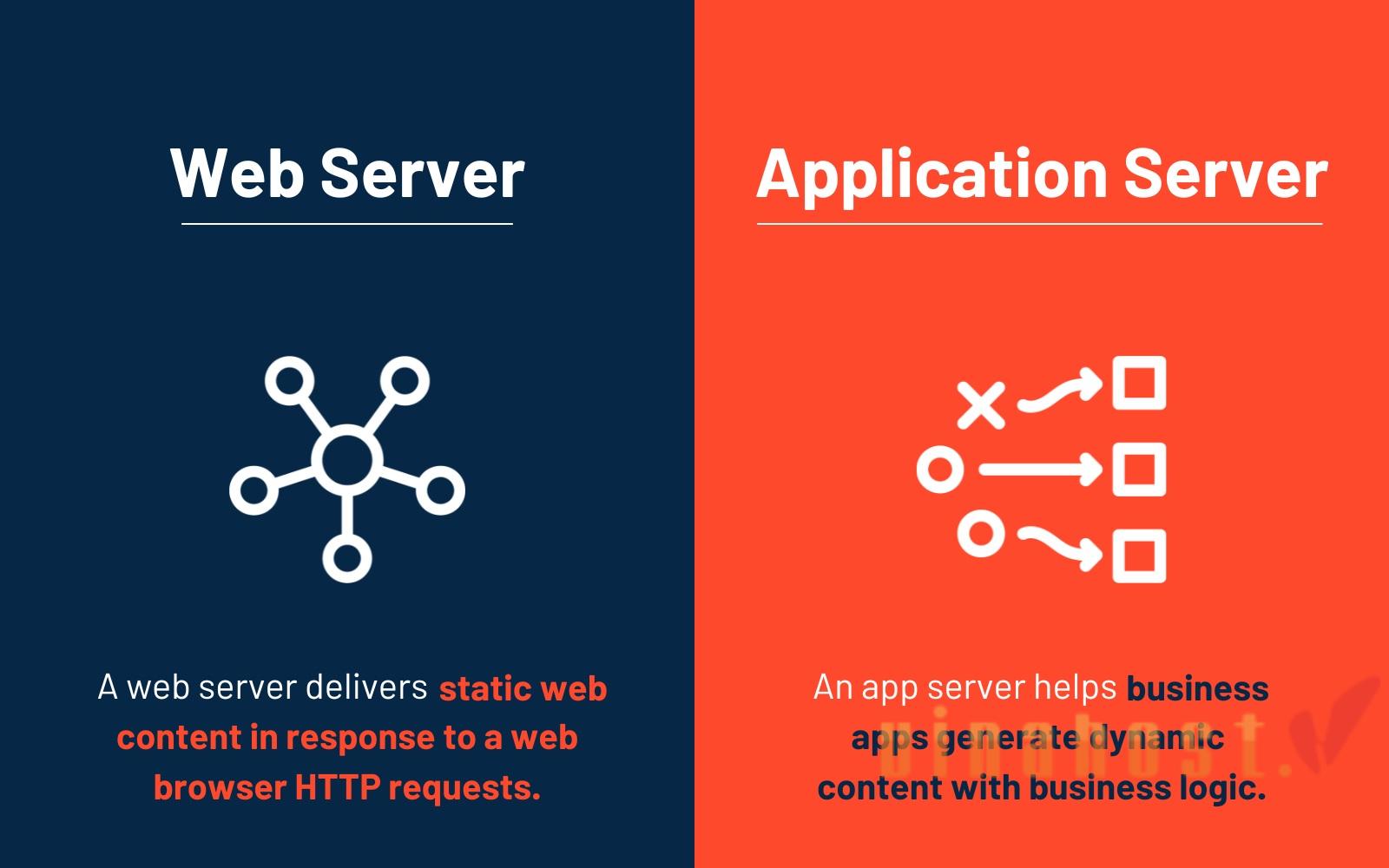
What is application server and web server? Here is a comparison table highlighting the key differences between an application server and a web server:
| What is the difference between web server and application server | What is an Application Server? | What is Web Server? |
|---|---|---|
| Function | Executes application code and processes business logic. | Handles HTTP requests and serves static content. |
| Dynamic content | Supports dynamic content generation and processing. | Primarily serves static content. |
| Language support | Supports multiple programming languages and frameworks. | Typically optimized for specific languages (e.g., PHP, Python). |
| Database access | Often integrates with databases for data manipulation. | Usually limited database connectivity. |
| Session management | Offers built-in session management and state tracking. | May provide basic session handling capabilities. |
| Transaction support | Supports distributed transactions and transaction management. | Generally lacks built-in transaction support. |
| Scalability | Offers scalability features for handling large workloads. | May require additional components for scalability. |
| Complexity | More complex with advanced features and capabilities. | Generally simpler with fewer features. |
| Use cases | Suitable for complex web applications and enterprise systems. | Ideal for serving static websites and simple web applications. |
7. Application Server vs Database Server
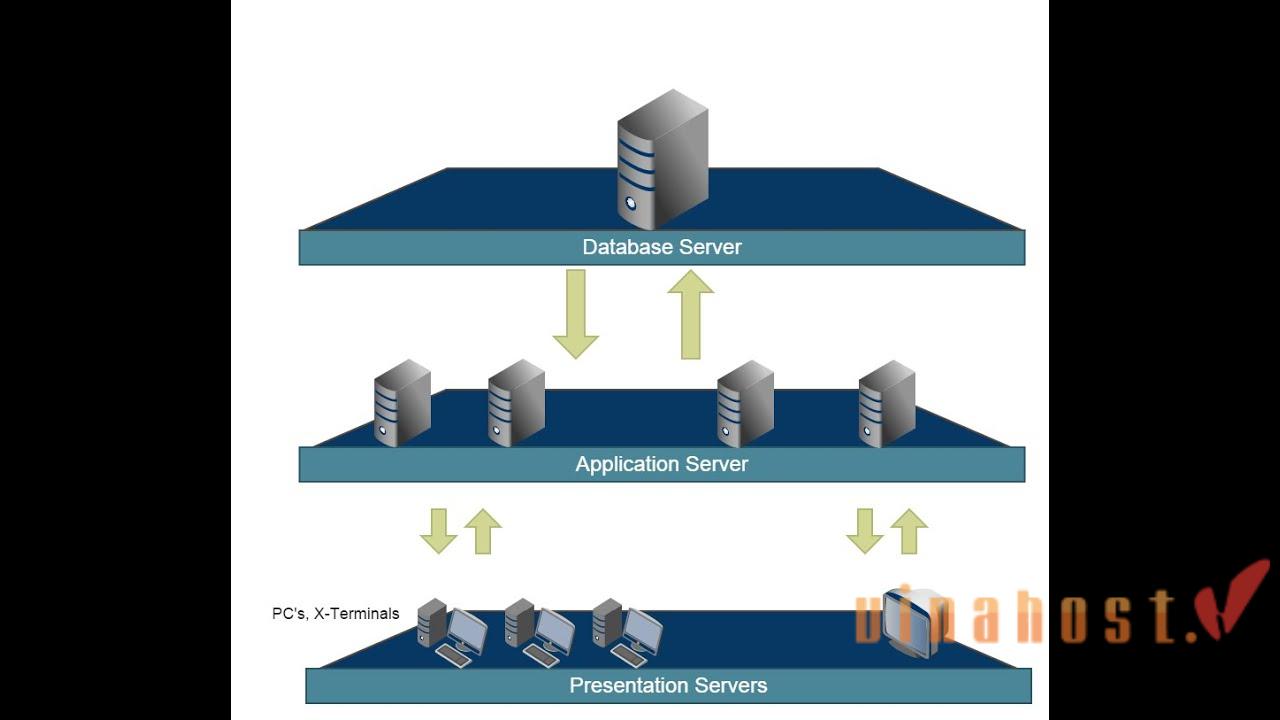
This table provides a succinct comparison of the roles and functionalities of application servers and database servers in the context of web application architecture and data management. Let’s take a look:
| Feature | What is an Application Server? | What is Database Server? |
|---|---|---|
| Function | Executes application logic and processes business logic. | Stores, manages, and retrieves data. |
| Processing | Executes application code written in various programming languages. | Processes SQL queries and data manipulation commands. |
| Dynamic content | Supports dynamic content generation and processing. | Stores and retrieves data for dynamic content generation. |
| Language support | Supports multiple programming languages and frameworks. | Optimized for querying and managing data using SQL. |
| Data management | Handles data processing and manipulation logic. | Stores and manages data using tables and indexes. |
| Transaction support | Provides transaction management capabilities. | Supports ACID properties and transaction processing. |
| scalability | Offers scalability features for handling large workloads. | Scales vertically or horizontally to manage data growth. |
| Complexity | May be complex with advanced features and capabilities. | Generally simpler with a focus on data management. |
| Use cases | Suitable for complex web applications and enterprise systems. | Ideal for managing structured data in various applications. |
8. Popular application server platforms
There are some popular application server platforms. These application server platforms offer a range of features and capabilities to support the development and deployment of web applications across various industries and use cases.
- VinaHost: VinaHost’s Dedicated Server services offer the perfect environment for your Application Server. Leveraging powerful Intel Xeon hardware, hosted in Tier 3 data centers, and backed by a 99.9% uptime commitment, our solutions provide the full administrative control and dedicated resources your critical applications require. Ensure seamless performance and superior user experience for your next deployment with a Dedicated server Vietnam.
- Apache Tomcat: A free, open-source server known for its reliability, performance, and ease of use. Popular for Java-based web applications and integrates well with Apache HTTP Server.
- Nginx: Primarily a web server, Nginx can also function as a lightweight application server. It excels at handling high traffic volumes and offers a scalable architecture.
- WildFly (formerly JBoss EAP): A powerful open-source server from Red Hat, offering robust features for enterprise-level deployments. It supports various languages like Java, PHP, and Python.
- Payara Server: A community-driven open-source fork of Oracle GlassFish Server, offering a mature platform with support for Java EE applications.
- Oracle WebLogic Server: A high-performance, commercially licensed server from Oracle, ideal for large-scale, mission-critical applications. It provides comprehensive features and strong integration with other Oracle products.
- IBM WebSphere Application Server: Another popular enterprise server with a robust platform for Java applications, offering features like high availability, security, and scalability.
- Microsoft IIS Application Server: Part of the Windows Server operating system, offering a cost-effective option for Windows environments. It integrates seamlessly with other Microsoft technologies like .NET and Active Directory.
- Amazon Web Services (AWS) Elastic Beanstalk: A cloud platform for deploying and scaling web applications and APIs. It supports various application servers and simplifies deployment on AWS infrastructure.
- Microsoft Azure App Service: A cloud application platform from Microsoft that offers automatic scaling, built-in security, and integration with other Azure services. It supports various programming languages and frameworks.
- Google Cloud App Engine: A managed platform for building and deploying web applications at scale on Google Cloud infrastructure. It offers pre-configured runtime environments for various programming languages.
FAQs
Are application servers limited to specific programming languages?Are application servers limited to specific programming languages?
No, application servers are not limited to specific programming languages. While some application servers may be optimized for certain languages or frameworks, many modern application servers support multiple programming languages and frameworks.
For example, Apache Tomcat primarily supports Java-based applications, while platforms like JBoss (WildFly) and IBM WebSphere Application Server provide broader support for various programming languages and technologies through Java EE standards.
Additionally, application servers like Microsoft Internet Information Services (IIS) support ASP.NET applications developed with languages such as C# and Visual Basic. Overall, the flexibility of modern application servers allows developers to choose the programming language and framework that best suits their project requirements.
How can I ensure the security of my application server?
By implementing these security measures below and maintaining a proactive approach, you can significantly reduce the risk of attacks and ensure the security of your application server.
Hardening the server:
- Minimize installed software: Only install essential software components needed for the application server to function. Reduce the attack surface by removing unnecessary services and applications.
- Keep software updated: Regularly update the application server software, operating system, and any additional software components with the latest security patches to address vulnerabilities.
- Use strong passwords: Implement strong password policies for all administrative accounts and enforce regular password changes. Consider multi-factor authentication (MFA) for added security.
- Secure configuration: Review and tighten the application server’s default configuration settings. Disable unused features and functionalities to minimize potential security risks.
- Network segmentation: Consider segmenting your network to isolate the application server from other systems, minimizing the potential impact of a security breach in one area.
Access control and authorization:
- Grant least privilege: Implement the principle of least privilege, granting users only the minimum permissions required to perform their tasks. Avoid giving users administrative access unless absolutely necessary.
- Role-Based Access Control (RBAC): Implement RBAC to define user roles with specific permissions, ensuring users can only access the resources and functionalities they need.
- Monitor user activity: Monitor user activity on the application server to detect suspicious behavior or unauthorized access attempts.
Data security:
- Data encryption: Encrypt sensitive data at rest (stored on the server) and in transit (transmitted over the network) to protect it from unauthorized access in case of a breach.
- Regular backups: Implement a regular backup schedule for your application server data and configuration files. Store backups securely off-site in case of a disaster or system failure.
Security monitoring and testing:
- Vulnerability scanning: Regularly scan the application server for vulnerabilities using security scanners. Address identified vulnerabilities promptly.
- Penetration testing: Consider engaging in periodic penetration testing to simulate real-world attacks and identify potential weaknesses in your security posture.
- Log monitoring: Monitor application server logs for suspicious activity, errors, and security alerts. Analyze logs regularly to identify potential security incidents.
Additional measures:
- Firewall configuration: Configure your firewall to restrict access to the application server to authorized users and systems. Block unnecessary incoming traffic.
- Secure coding practices: Encourage secure coding practices among developers to minimize the risk of introducing vulnerabilities into your applications.
- Stay informed: Keep yourself updated on the latest security threats and vulnerabilities related to application servers. Apply security patches and best practices promptly.
Can I develop my own application server?
Yes, you can develop your own application server if you have the necessary programming skills and knowledge. It involves designing and implementing software that can handle incoming requests, execute application logic, and interact with databases or other systems.
You’ll need to choose a programming language and framework, design the architecture, implement functionality, test thoroughly, and implement security measures. While it can be a challenging task, developing your own application server allows for customization and control over your server-side infrastructure.
Advantages:
- Customization: You can tailor the server to your specific needs and requirements, with complete control over features and functionalities.
- Performance optimization: You can potentially optimize the server for your specific application stack and workloads, achieving higher performance.
- Reduced reliance on third-party vendors: Developing your own server eliminates dependence on external vendors and their licensing fees.
Disadvantages:
- Complexity: Building a robust application server requires in-depth knowledge of networking, security, protocols, and application development.
- Resource intensive: The development process can be time-consuming and resource-intensive, requiring a skilled development team.
- Maintenance and support: You’ll be responsible for ongoing maintenance, bug fixes, security updates, and compatibility with evolving technologies.
Can an application server be used for hosting static websites?
Yes, technically, an application server can be used to host static websites, but it’s not the most efficient or optimal solution. Application servers are designed to handle dynamic content generation and processing, which involves executing server-side code and interacting with databases or other systems to generate web pages dynamically.
Hosting a static website on an application server would involve unnecessary overhead and complexity, as the server would still need to process requests and serve static files without any dynamic content generation.
Instead, it’s more common and recommended to use a web server like Apache HTTP Server or Nginx for hosting static websites, as they are specifically optimized for efficiently serving static content without the overhead of executing server-side code.
In conclusion, application servers play a critical role in the web application environment. They act as the connection between the user’s request and the data that powers the application, ensuring smooth and dynamic experiences.
By understanding what is an application server and how they work, you gain valuable insight into the complex ecosystem that delivers the web applications we rely on daily. Moreover, understanding the inner workings of application servers empowers organizations to optimize their infrastructure, enhance performance, and bolster security.


 Tiếng Việt
Tiếng Việt English
English 简体中文
简体中文






